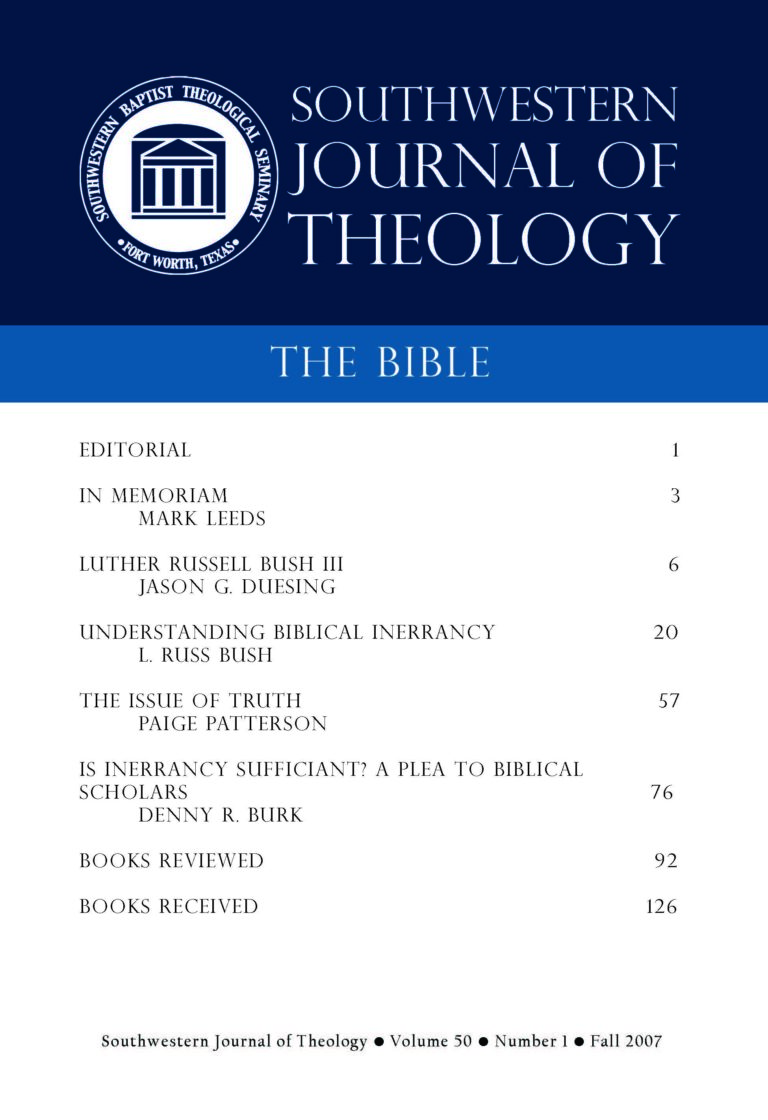
The Bible
Southwestern Journal of Theology
Volume 50, No. 1 – Fall 2007
Managing Editor: Malcolm B. Yarnell III
By Michael Pasquarello III. Grand Rapids: Baker Academics, 2006. 215 pages. Softcover, $18.99.
In Christian Preaching, Michael Pasquarello III cites a major need for revision in the church. He believes a problem has resulted from a change of subject in the pulpit. Whereas in the past the Triune God was the subject, object, and driving force behind all that the church was and did, now the sense of reverence for the Triune God as the center of ecclesiology has been lost. Pasquarello believes this has occurred because the Trinity is fundamentally absent in the proclamation event today.
Pasquarello identifies Finney and his preaching as a typical example of making man and not God the subject of proclamation. He continues to argue that Rick Warren is a contemporary practitioner and disciple of Finney’s homiletic. Pasquarello then explains that the issue is not fixed by examining a method of interpretation or delivery, but by recapturing a sense of who the Triune God is and learning to see preaching as a theological practice that worships, loves, and proclaims the Trinity and causes the listeners to do the same.
He offers seven chapters that define preaching in terms of speaking of God with a certain emphasis such as creating a redeemed community that God chooses to work through (Ecclesial Practice) and creating a place where we behold our destiny as a community awaiting the New Jerusalem (Pilgrim Practice) (87–109, 183–204). In each chapter, he supports his claim by offering the practice and writing of a major figure of church history such as Augustine, Luther, and Wesley. Ultimately, his aim is the “‘changing of the subject’ of Christian preaching from ourselves to the Triune God” (10).
Pasquarello may have missed an opportunity with this work to ex- plain how the doctrine of the Trinity should impact the preparation and delivery of a message. In the title and introduction, it appeared he would take such an opportunity. Instead, he argues for the Trinity as the content of preaching and for the use of Trinitarian language in our liturgy. A re- view of literature in the area of preaching and theology indicates that there is a deficiency in studies that examine this connection. There are a couple of other weaknesses in this work as well. First, in most chapters the specific claim he is trying to make and how it relates to the corresponding title is unclear. For instance in Chapter 4, Pasquarello does not give a summary statement of the claim until pages 19 and 20, which is almost halfway through the chapter, and even when he does, it is long and tedious. Second, by analyzing his sample sermons, it is questionable whether he has, in fact, delivered what he promised. It appears in some cases he fails to make what God has intended the center of his preaching. Pasquarello does this by al- lowing his theology to drive the sermon and not the text proper.
Pasquarello, however, must be praised on at least two counts. First, he offers strong historical evidence to support his claims by drawing on and explaining the preaching and theology of some prominent figures in church history. Second, he rightly identifies the problem in the pulpit to- day that derives from man-centered preaching as a theological issue. As such, he addresses the problem and attempts to rectify the issue through a theological discussion and not by offering a “preaching how-to.” This volume is for any serious student of preaching and anyone who cares deeply about the proclamation of God’s Word with the cautions that it is not an easy read nor is it intended to be a textbook on how to prepare and deliver a message.





